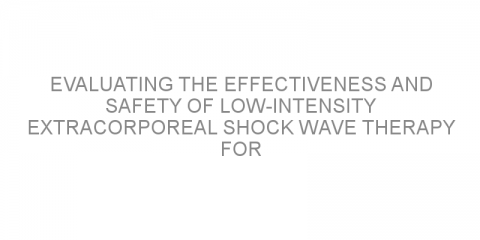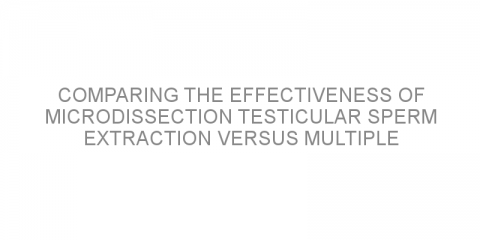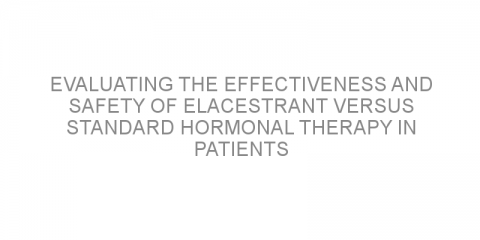In a nutshell This study evaluated the long-term effectiveness and safety of 3-month versus 6-month modified FOLFOX (5-fluorouracil, leucovorin, and oxaliplatin) or CAPOX (capecitabine and oxaliplatin) treatment after surgery in patients with stage 3 colon cancer. The data showed that 3-month modified FOLFOX/CAPOX treatment was as effective and safe as...
Read MoreEvaluating the effectiveness and safety of low-intensity extracorporeal shock wave therapy for patients with diabetes and erectile dysfunction.
In a nutshell This study evaluated the effectiveness and safety of low-intensity extracorporeal shock wave therapy (Li-ESWT) for patients with diabetes and erectile dysfunction (ED). The data showed that Li-ESWT was safe and effective in improving the symptoms of ED in these patients. Some background Erectile dysfunction (ED) consists of the inability...
Read MoreEvaluating the effectiveness and safety of low-intensity extracorporeal shock wave therapy for patients with diabetes and erectile dysfunction.
In a nutshell This study evaluated the effectiveness and safety of low-intensity extracorporeal shock wave therapy (Li-ESWT) for patients with diabetes and erectile dysfunction (ED). The data showed that Li-ESWT was safe and effective in improving the symptoms of ED in these patients. Some background Erectile dysfunction (ED) consists of the inability...
Read MoreComparing the effectiveness of microdissection testicular sperm extraction versus multiple needle-pass percutaneous testicular sperm aspiration in infertile men with non-obstructive azoospermia.
In a nutshell This study directly compared the effectiveness of microdissection testicular sperm extraction (mTESE) versus multiple needle-pass percutaneous testicular sperm aspiration (TESA) in infertile men with non-obstructive azoospermia (NOA). The data showed that the sperm retrieval rate was higher with mTESE than with multiple needle-pass...
Read MoreEvaluating the effectiveness and safety of elacestrant versus standard hormonal therapy in patients with ER+/HER2- advanced BC.
In a nutshell This study evaluated the effectiveness and safety of elacestrant (RAD1901) versus standard hormonal therapy in patients with estrogen receptor-positive (ER+) and HER2-negative (HER2-) advanced breast cancer (BC). The data showed that elacestrant significantly improved survival without cancer worsening with manageable side effects in these...
Read More







